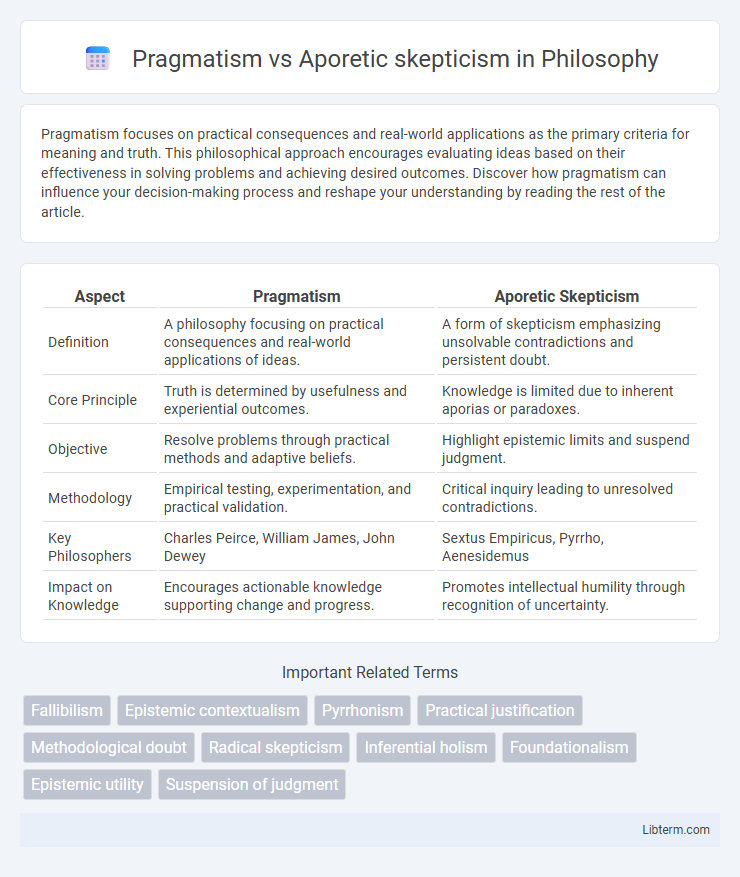Pragmatism focuses on practical consequences and real-world applications as the primary criteria for meaning and truth. This philosophical approach encourages evaluating ideas based on their effectiveness in solving problems and achieving desired outcomes. Discover how pragmatism can influence your decision-making process and reshape your understanding by reading the rest of the article.
Table of Comparison
| Aspect | Pragmatism | Aporetic Skepticism |
|---|---|---|
| Definition | A philosophy focusing on practical consequences and real-world applications of ideas. | A form of skepticism emphasizing unsolvable contradictions and persistent doubt. |
| Core Principle | Truth is determined by usefulness and experiential outcomes. | Knowledge is limited due to inherent aporias or paradoxes. |
| Objective | Resolve problems through practical methods and adaptive beliefs. | Highlight epistemic limits and suspend judgment. |
| Methodology | Empirical testing, experimentation, and practical validation. | Critical inquiry leading to unresolved contradictions. |
| Key Philosophers | Charles Peirce, William James, John Dewey | Sextus Empiricus, Pyrrho, Aenesidemus |
| Impact on Knowledge | Encourages actionable knowledge supporting change and progress. | Promotes intellectual humility through recognition of uncertainty. |
Introduction to Pragmatism and Aporetic Skepticism
Pragmatism, a philosophical tradition emphasizing practical consequences and real-world applications as the basis for meaning and truth, contrasts sharply with aporetic skepticism, which centers on persistent doubt and the recognition of insoluble philosophical puzzles or aporias. Pragmatists like Charles Sanders Peirce and William James prioritize ideas that yield actionable results and problem-solving efficacy, while aporetic skepticism highlights enduring uncertainties that challenge the possibility of certain knowledge. This fundamental divergence influences epistemology by either promoting constructive belief systems grounded in experience or embracing the suspension of judgment due to unresolved contradictions.
Historical Origins and Key Figures
Pragmatism originated in the late 19th century with key figures like Charles Sanders Peirce, William James, and John Dewey, emphasizing practical consequences and real-world applications of ideas as the basis for truth. Aporetic skepticism, rooted in ancient Greek philosophy, particularly in the works of Pyrrho and Sextus Empiricus, focuses on the suspension of judgment due to the presence of irresolvable contradictions (aporia) in knowledge claims. While pragmatism seeks actionable certainty through experience, aporetic skepticism embraces persistent doubt to avoid dogmatism, highlighting their contrasting approaches to epistemology.
Core Principles of Pragmatism
Pragmatism centers on the practical consequences of beliefs and ideas, asserting that truth is determined by their usefulness and effectiveness in real-world applications. Core principles include the emphasis on experience, action, and the continuous testing of ideas through problem-solving and experimentation. This approach contrasts with aporetic skepticism, which remains unresolved and questions the possibility of certain knowledge without seeking practical outcomes.
Fundamental Tenets of Aporetic Skepticism
Aporetic skepticism centers on the fundamental tenet that genuine knowledge is unattainable due to the persistent contradictions and uncertainties inherent in human reasoning. This philosophical stance emphasizes continuous inquiry and suspension of judgment (epoche) without claiming definitive answers, contrasting with pragmatism's focus on practical outcomes and utility of beliefs. Aporetic skeptics maintain that recognizing the limits of cognition leads to intellectual humility and ongoing exploration, rather than adopting fixed doctrines.
Practical Approaches to Knowledge
Pragmatism emphasizes the practical consequences of beliefs as the primary criterion for their truth and usefulness, advocating for knowledge grounded in actionable outcomes and problem-solving efficacy. Aporetic skepticism highlights the persistent difficulty in achieving certain knowledge, prioritizing inquiry and the acknowledgment of unresolved contradictions over definitive conclusions. The practical approach of pragmatism contrasts with the aporetic skeptic's suspension of judgment, promoting knowledge that facilitates decision-making despite uncertainties.
The Role of Doubt and Inquiry
Pragmatism views doubt as a catalyst for practical inquiry, driving individuals to test ideas through experience and results to resolve uncertainty. Aporetic skepticism embraces doubt as an enduring state of puzzlement, emphasizing the suspension of judgment due to irresolvable contradictions or lack of conclusive evidence. Both frameworks place inquiry at the core, but pragmatism seeks actionable solutions while aporetic skepticism highlights the limits of human knowledge.
Pragmatic Solutions vs. Skeptical Challenges
Pragmatism emphasizes practical solutions grounded in the outcomes of ideas and actions, prioritizing what works effectively in real-world contexts. Aporetic skepticism presents challenges by questioning the certainty and foundations of knowledge, highlighting paradoxes and unresolved contradictions. The tension between pragmatic solutions and skeptical challenges drives ongoing philosophical inquiry, balancing actionable insights with critical reflection on the limits of understanding.
Impacts on Modern Philosophy
Pragmatism emphasizes practical consequences and actionable truths, significantly influencing contemporary philosophy by promoting experiential learning and adaptive problem-solving frameworks. Aporetic skepticism, grounded in unresolved contradictions and persistent questioning, challenges absolute knowledge claims and fosters intellectual humility in philosophical inquiry. The tension between pragmatic certainty and aporetic doubt shapes modern epistemological debates, steering discourse toward both practical applicability and critical reflection.
Criticisms and Counterarguments
Pragmatism faces criticism for potentially neglecting absolute truths in favor of practical outcomes, which skeptics argue undermines rigorous philosophical inquiry. Aporetic skepticism challenges the pragmatist stance by emphasizing unresolved contradictions and persistent doubts that pragmatism's practical orientation may overlook or dismiss. Counterarguments from pragmatists highlight their focus on adaptability and problem-solving, asserting that epistemic certainty is less crucial than effective action and ongoing inquiry.
Conclusion: Bridging Pragmatism and Skepticism
Pragmatism and aporetic skepticism converge by acknowledging uncertainty while emphasizing practical action. Pragmatism advocates for belief systems validated through experiential outcomes, whereas aporetic skepticism highlights persistent doubt and unresolved inquiry. Bridging these philosophies involves embracing skepticism's critical reflection to refine pragmatic methods, fostering adaptive and resilient knowledge frameworks.
Pragmatism Infographic

 libterm.com
libterm.com